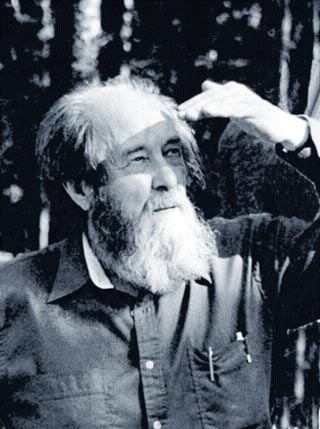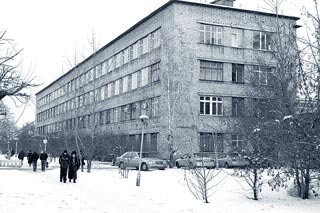









 We live in an interesting time. The next epoch is to be expected, a new era of
mingling ideas and conceptions. On TV we can watch the “masterpiece “First
Circle”, while, on another channel, they are showing another “masterpiece” about
espionage “by means of paving stones” almost every day. This is no pluralism,
not even eclecticism, which is only characterized as such by philosophs, and
which psychiatrists exclusively call schizophrenia. Stalin’s, Yeltsin’s,
Brezhnev’s, Khrushchev’s and putin’s times are catching up with eachother, they
are in a permanent rotation, and everything is dancing in front of one’s eyes
from all the arising interferences. By the way, as you can see, I wrote
“putin’s” in small letters. In Nizhni Novgorod a man came within an ace of being
put into prison for the same “deed” a week ago – he got off with a “suspended
sentence of four years”. However, don’t count your chickens before they are
hatched! That’s probably not the last we have heard of that.
We live in an interesting time. The next epoch is to be expected, a new era of
mingling ideas and conceptions. On TV we can watch the “masterpiece “First
Circle”, while, on another channel, they are showing another “masterpiece” about
espionage “by means of paving stones” almost every day. This is no pluralism,
not even eclecticism, which is only characterized as such by philosophs, and
which psychiatrists exclusively call schizophrenia. Stalin’s, Yeltsin’s,
Brezhnev’s, Khrushchev’s and putin’s times are catching up with eachother, they
are in a permanent rotation, and everything is dancing in front of one’s eyes
from all the arising interferences. By the way, as you can see, I wrote
“putin’s” in small letters. In Nizhni Novgorod a man came within an ace of being
put into prison for the same “deed” a week ago – he got off with a “suspended
sentence of four years”. However, don’t count your chickens before they are
hatched! That’s probably not the last we have heard of that.
The novel was written during the time of the first (Khrushchev’s) thaw; the film started showing in the cinema towards the end of the second. It was made about the past, it is aiming at the presence and it dropped straight into the future. But in actual fact both vook and film are everlasting. The camp, the so-called “sharashka”, just represents the background, which is described in good knowledge of the facts and based on a fictitious course of action. The essential point is to show that man always has the option of making his own moral choice, which, strictly speaking, does not only differentiate true art from shabby forgery, but also from qualitative fiction.
Every man is free up to a degree he deserves. Everybody either finds for himself a backbone, a support – or he does not. Prisoner Nerzhin is free in a certain sense of the word, Abakumov, Minister of State Security – is not. This is what the film points out in an excellent way. I think that Danilov, too, while serving his sentence in the camp zone of Gromadsk, is freer then those, who have made the final decision to keep him there in detention. Freedom, after all, does not mean that you can do or refrain from whatever you want to, it means that nobody else can force you to do something, which contradicts your own innermost conviction. NOT to do something often is a DEED. Man’s life is full of situations, in which he is tempted or even forced to do something, to act in a certain way. And towards the end of his life it often turns out that the most essential “deeds” in his life were not those he accomplished, but those he desisted from. For example, that de did not steal, kill or lie.
One of the biggest problems of the GULAG administration were the farmers, first of all the old-believers among them. No corporal punishment could constrain them to work on religious holidays, and by no means were they willing to denounce other people, even when they were promised the earth. They just said: “I am not allowed to do that” or “that is something I cannot do”. Even if they were stubborn as a mule – nothing would help to change their mind.
For the faithful everything seemed to be a little easier – for God was with them. With the atheists things were by far more complicated, although they found courage from themselves, as well. However, thereare not too many people who are able to find this moral backbone in themselves. It is not without reason that Solzhenitsyn talks about the necessity to form and train one’s own heart and soal. For if ther is a soal at all, than there is something man can rely upon – a moral stay. If this is not the case, he will irrevocably sink into the mud of his own faintheartedness, no matter to which level of the vertical line the powers drove him.
 Let us get back, however, to the “sharashka”. Maybe some people do not know that
such a “sharashka” also existed in Krasnoyarsk – exactly in the place, where
nowadays lawyers and journalists receive their academic training (as if there
was some symbolic meaning!) – on Maerchak Street No. 6; in former times it was
called OTB-1 (secret technical office No. 1; translator’s note). There the
leading experts of the country in the field of geology slurped their watery soup,
and some time or other, the “Siberian Research Institute of Non-ferrous Metals”
developed from this “sharashka”, leaving a somewhat black spot in its biography-
For many years the Krasnoyarsk “Memorial” Organization has been trying to put up
a memorial plate to the building – an absolutely futile attempt. The people want
to commemorate victories; they are not interested in being reminded of the high
price that was paid for them. And they do not want to recall any crimes, either.
In the third volume of the regional edition of the Book of Memory, published in
commemoration of the victims of political reprisals, you will not find a single
name (unlike the first two volumes) of an NKVD investigator. Today’s chekists,
at whose insistence these details were removed from the book, say:” Well, you
know, all this was a symptom of those times: if they had not taken care of
turning the key on these people, of even shooting them dead – they would have
been executed themselves. There was a plan, a norm which had to be fulfilled”.
Let us get back, however, to the “sharashka”. Maybe some people do not know that
such a “sharashka” also existed in Krasnoyarsk – exactly in the place, where
nowadays lawyers and journalists receive their academic training (as if there
was some symbolic meaning!) – on Maerchak Street No. 6; in former times it was
called OTB-1 (secret technical office No. 1; translator’s note). There the
leading experts of the country in the field of geology slurped their watery soup,
and some time or other, the “Siberian Research Institute of Non-ferrous Metals”
developed from this “sharashka”, leaving a somewhat black spot in its biography-
For many years the Krasnoyarsk “Memorial” Organization has been trying to put up
a memorial plate to the building – an absolutely futile attempt. The people want
to commemorate victories; they are not interested in being reminded of the high
price that was paid for them. And they do not want to recall any crimes, either.
In the third volume of the regional edition of the Book of Memory, published in
commemoration of the victims of political reprisals, you will not find a single
name (unlike the first two volumes) of an NKVD investigator. Today’s chekists,
at whose insistence these details were removed from the book, say:” Well, you
know, all this was a symptom of those times: if they had not taken care of
turning the key on these people, of even shooting them dead – they would have
been executed themselves. There was a plan, a norm which had to be fulfilled”.
By the way, things do not look too rosy for us, as well. But man can always choose, man always has the possibility to REFRAIN from doing something. This is what Nerzhin and Gerasimovich did. And this is what some Chekists of the 1930s did by simply putting themselves a bullet through their head. There were others, however, who decided not to proceed that way – Arkadiy Mamontov, just to give an example. We are always confronted with the problem of whether to do what time demands of us (and we just live in quite a perfidious time) or better act in accordance with what our conscience tells us to do. The above-mentioned film brought up these questions – God grant that the people got a thought-provoking impulse, that the remain staunch and do not take a negative development.
Finally something which afflicts to the most. We were cooperating with a female student, writing a research work on this very OTB-1. We collected a lot of documents, tried to find out and comprehend as many details as possible and to sympathize with the prisoners, feel the atmosphere of their existence in the “sharashka”. Strange to say we discovered (this was also very well reflected in the film) that the prisoners of the “sharashka” were fairly well fed – it sometimes happened that they were unable to finish the cutlet they had received for lunch. t this time real famine was raging “overboard”, particularly in the countryside (as well as in “common” camps). Foolishly enough I asked the girl: if you had the choice to be hungry but free – or sit well-fed in prison – what would you decide for? The girl looked at me as if she had an idiot in frontof her. Then she said: Of course, I would prefer to be well-fed, even if this would mean the lack of freedom.
Hello, young unknown generation! This girl never experienced Soviet times personally – it was bornmuch later.
Aleksei BABIY, chairman of the Krasnoyarsk “Memorial” Organization
ON THE PHOTO: A. Solshenitsyn – Stolby National Park (1995).
Somewhere over there, on Maerchak Street, therewas his “Sharashka”
Photo taken by: V. Sokolenko
“Krasnoyarsk Worker”, 14.02.2006